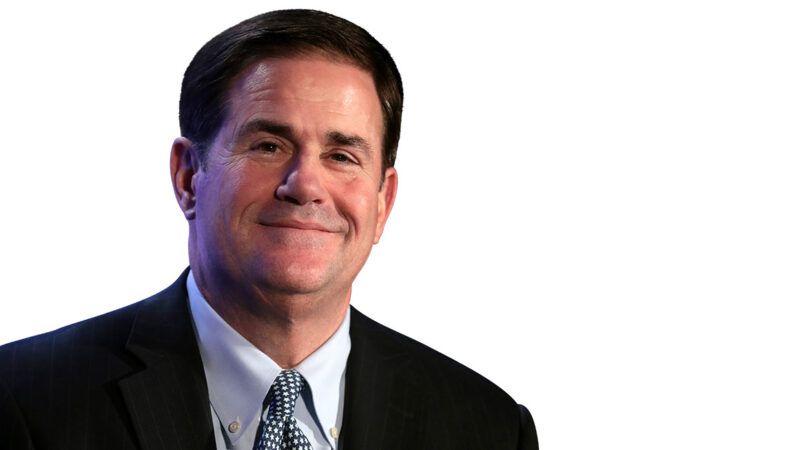Doug Ducey on Budget Cuts, School Choice, and Arizona's Weird Politics
"Governors don't get to print money," the former Arizona governor tells Reason.

In December, former Arizona Gov. Doug Ducey received the Savas Award for Privatization, given annually to someone for innovation in the provision and quality of public services by engaging the private sector. The award is given by Reason Foundation, the nonprofit that publishes Reason. Editor in Chief Katherine Mangu-Ward sat down with Ducey in December to talk about school choice, how to cut budgets, and why Arizona politicians are so weird.
Q: What is it about Arizona that seems to generate heterodox or unorthodox politicians?
A: Maybe the fact that we're the youngest state in the lower 48, that we're a place where so many people came to live. So few people that are there today were actually born there. People make that decision. There's something about the West and the spirit of Barry Goldwater, it brings an independent-mindedness to it.
Q: In the modern GOP, you get a lot of emphasis on tax cutting and a lot less on the reduction of spending or balancing the budget. Do you think there's a way to reconnect those two ideas in American political rhetoric or voters' minds?
A: Well, Katherine, I think you live here in Washington, D.C., and that's what you are responding to as to how the Republicans in this town behave. You see the Democrats tax and spend. You see the Republicans in Washington, D.C., cut taxes and borrow. Governors don't get to print money and there's no appetite to borrow money except in the worst of a crisis. So you really do have to find a way to shrink your government.
I'm proud of the growth and attractiveness of Arizona. We have 400,000 additional people in Arizona vs. the day that I came into office. But our state government is smaller. We were actually able to shrink the footprint of our state government, the number of people inside the state government, the number of buildings, and real estate holdings of the state government.
Q: What was the state of play on school choice in Arizona when you came in, and what did it look like when you left?
A: Arizona has always been very good on school choice, and it's something that I believe in. I stood on the shoulders of giants like Lisa Graham Keegan and Fife Symington. At the state level, we have 525 schools of choice in Arizona, charter schools, [which are] public schools with private management. If you take those schools, that's the No. 1 state in the nation for accomplishment on math, reading, and science. We did a lot to grow that model. The BASIS Schools system and Great Hearts were both founded in Arizona. Part of what animated my run for governor in 2014 was universal school choice. The Milton Friedman idea that he shared on Free to Choose is something that took me all eight years of my governorship to accomplish.
Q: And what about education savings accounts, which are essentially vouchers?
A: Milton Friedman also said in a crisis, people will look for the ideas that are lying around. And the crisis that came was COVID, and parents were able to see what their kids were being taught or not taught and the level of rigor and expectation from the public schools. They also saw that the charter schools opened and the Catholic schools opened and many of the largest public districts chose to stay closed for nearly two years, even when the government was telling them to open. So we were able to pass universal educational savings accounts. And every child in the state of Arizona is able to take a large portion of their tax dollars and go wherever they would like to school, including homeschool, microschool, or a new school. We were able to move the bar to the highest rung. Nine other states have since followed with universal school choice. Texas and Tennessee are on the one-yard line.
This interview has been condensed and edited for style and clarity.


Show Comments (228)